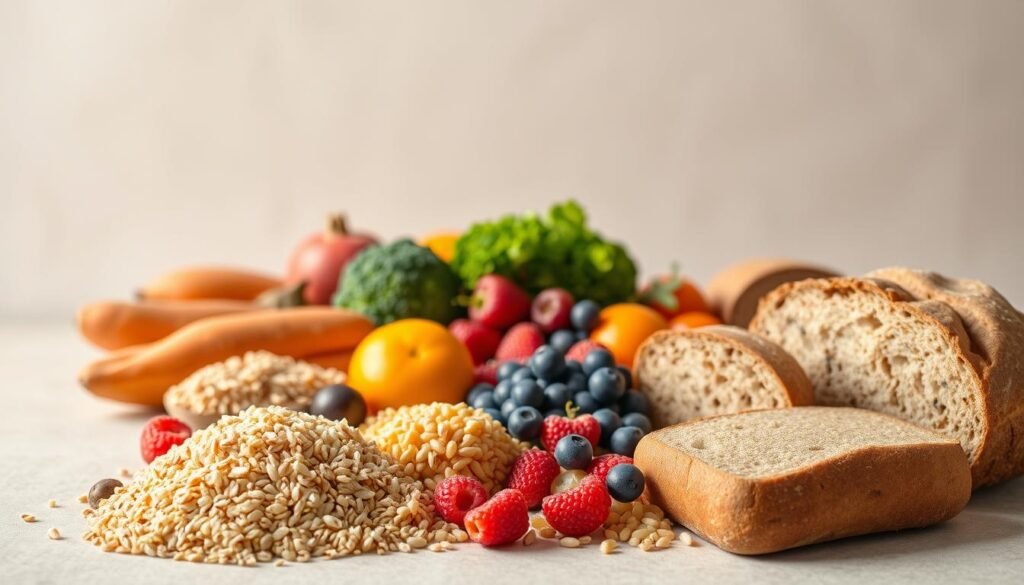
Getting to a healthy weight isn’t just about quick fixes. The Academy of Nutrition and Dietetics says to lose weight slowly, aiming for 1-2 pounds a week. Starting your journey to a healthier body means understanding the right way to lose weight.
It’s not about making big changes all at once. Instead, it’s about finding habits that fit your life. Sustainable weight loss is about making changes that last, improving your health and happiness. It’s about a plan that covers nutrition, exercise, and your mindset.
Many people want to lose weight fast. But the real success comes from making smart, consistent choices. By using proven strategies, you can lose weight in a way that lasts.
Key Takeaways
-
- Aim for gradual weight loss of 1-2 pounds per week
-
- Focus on sustainable lifestyle changes
-
- Avoid extreme or fad diets
-
- Develop a holistic approach to weight management
-
- Prioritize long-term health over quick results
-
- Create realistic and achievable weight loss goals
-
- Understand that consistency is key to success
Understanding the Foundation of Sustainable Weight Loss
Long-lasting weight loss starts with knowing your body’s metabolic processes. It’s not about quick fixes or crash diets. Instead, focus on strategies that support long-term health and wellness.
Managing weight is complex, involving many factors. Your metabolism is key to losing weight and keeping it off.
The Science Behind Healthy Weight Reduction
To understand weight loss, you need to grasp basic biology. Your metabolism controls how your body uses and stores energy. Important factors include:
-
- Basal metabolic rate
-
- Muscle mass percentage
-
- Hormonal balance
-
- Genetic predispositions
Setting Realistic Weight Loss Goals
Setting achievable goals is vital for lasting weight loss. Setting smart goals keeps you motivated and avoids frustration. Here are some tips:
-
- Target 1-2 pounds of weight loss each week
-
- Focus on body composition, not just weight
-
- Record non-scale victories
Creating a Caloric Deficit Safely
A safe caloric deficit is essential for weight loss. Your plan should balance food intake and energy use.
| Calorie Reduction Method | Weekly Deficit | Potential Weight Loss |
|---|---|---|
| Moderate Diet Adjustment | 500 calories/day | 1 pound/week |
| Exercise + Diet | 750 calories/day | 1.5 pounds/week |
| Comprehensive Lifestyle Change | 1000 calories/day | 2 pounds/week |
Sustainable weight loss is a journey of making mindful, consistent choices. Your body deserves a thoughtful, science-backed approach to health and nutrition.
Best Habits to Lose Weight: A Comprehensive Approach
For lasting weight loss, you need more than just dieting. The best habits include a mix of good eating, regular exercise, and lifestyle changes.
Starting your weight loss journey means making small, steady changes. It’s not about strict diets. It’s about building healthy eating habits that your body loves.
-
- Develop a balanced meal plan
-
- Practice portion control
-
- Incorporate daily exercise habits
-
- Stay hydrated
-
- Get adequate sleep
Regular exercise is key for losing weight. Consistency trumps intensity. You don’t need long workouts. Just regular, moderate activities to keep your metabolism up and burn calories.
| Habit Category | Key Actions | Expected Outcome |
|---|---|---|
| Nutrition | Balanced meals, protein intake | Metabolic boost, reduced cravings |
| Exercise | 30 minutes daily movement | Increased calorie burn, muscle maintenance |
| Mindset | Positive self-talk, goal setting | Sustained motivation, long-term success |
Remember, losing weight is a personal journey. What works for one might not work for another. The goal is to find a balance that feels good and fun for you.
Mindful Eating Techniques for Weight Management
Changing how you view food is more than just counting calories. Mindful eating is a strong way to manage weight by focusing on your connection with food and your body. Studies show that controlling portions can greatly help in losing weight.
Being aware of your eating habits helps you choose food more thoughtfully. Learning to create a balanced plate is key to lasting nutrition plans that help you lose weight.
Practicing Portion Control
Effective portion control needs smart strategies:
-
- Use smaller plates to naturally reduce serving sizes
-
- Measure food portions using kitchen tools
-
- Learn standard serving size recommendations
-
- Practice visual portion estimation
Eating Without Distractions
Mindful eating means giving your meal your full attention. Turn off digital devices and focus on:
-
- Chewing slowly
-
- Appreciating food texture and flavor
-
- Engaging all senses during meals
Understanding Hunger and Fullness Cues
Learn to tell physical from emotional hunger with these tips:
| Physical Hunger Signs | Emotional Hunger Signs |
|---|---|
| Gradual stomach growling | Sudden craving for specific foods |
| Energy depletion | Triggered by stress or emotions |
| Willingness to eat balanced meal | Desire for comfort foods |
Mastering mindful eating takes practice. Start small and be patient with yourself as you develop these important skills.
Strategic Meal Planning and Nutrition
Making a smart meal plan is key for losing weight. Your first step is choosing foods that fuel your body and help with weight control. Whole foods are your allies in making meals that are full of nutrients, keep you full, and give you energy.
When planning your meals, keep these nutrition tips in mind:
-
- Prioritize whole food ingredients for the best nutrition
-
- Make balanced meals with lean proteins, complex carbs, and healthy fats
-
- Plan meals ahead to avoid bad food choices
-
- Add a variety of colorful fruits and veggies
Eating whole foods does more than help you lose weight. They keep your blood sugar stable, improve digestion, and give you energy all day. By making meals with protein, fiber, and important nutrients, you’re on the path to lasting success.
Along with smart meal planning, many people also explore natural supplements to help fill nutritional gaps and support their metabolism—here are a few that consistently rank among the top for energy, digestion, and fat-burning.
“Meal planning is not about perfection, but about making consistent, healthier choices.” – Nutrition Experts
Your meal prep should be easy and last long. Spend a few hours each week planning and cooking meals. Fill your kitchen with whole foods, get good storage containers, and make a meal plan that keeps your diet interesting and full of nutrients.
-
- Batch cook proteins and grains
-
- Chop veggies ahead of time
-
- Have healthy snacks ready
-
- Use herbs and spices for flavor without extra calories
Good nutrition for slimming is about living a healthy lifestyle, not just following a diet. Your meal plan should be flexible, fun, and fit your personal needs and likes.
The Power of Protein in Weight Loss
Protein is key in your weight loss journey. It boosts your metabolism and helps you slim down. Your body uses protein in a special way, making it essential for managing weight.
Knowing how protein affects your metabolism changes how you eat. It’s not just about eating less. It’s about eating the right foods.
Optimal Protein Sources
Choosing the right protein is important for losing weight. Here are your best options:
-
- Lean meats like chicken and turkey
-
- Fish rich in omega-3s
-
- Plant-based proteins such as lentils and quinoa
-
- Low-fat dairy products
-
- Eggs
Timing Your Protein Intake
Eating protein at the right times boosts your metabolism. Spread out your protein intake to keep your energy up and muscles strong.
Here’s when to eat protein:
-
- Breakfast: 20-25 grams
-
- Post-workout: 15-20 grams
-
- Dinner: 25-30 grams
Protein’s Role in Metabolism
Protein has a higher thermic effect than carbs and fats. This means your body burns more calories digesting it. It helps you slim down.
Increasing protein intake can boost metabolism by 80-100 calories per day.
By following these protein tips, you’ll improve your weight loss and keep your metabolism healthy for the long term.
Smart Carbohydrate Management

Managing carbohydrates can be challenging when you’re trying to eat healthy for weight loss. Not all carbs are the same. It’s important to know how to create a balanced plate for lasting weight loss.
Carbs are essential for your diet, but picking the right ones is key. Here’s a guide on smart carb choices:
-
- Prioritize complex carbohydrates over simple sugars
-
- Choose whole grains, vegetables, and legumes
-
- Control your carb portions
The glycemic index is a helpful tool for carb management. Low-glycemic carbs help keep your blood sugar stable and make you feel full longer. Some good options include:
-
- Sweet potatoes
-
- Quinoa
-
- Beans and lentils
-
- Whole grain bread
When making a balanced plate, aim for carbs to be 25-30% of your meal. Pair them with lean proteins and healthy fats. This creates a meal that’s good for your weight management goals.
Remember, carbohydrates are not the enemy – quality and quantity are what matter most in healthy eating for weight management.
Here are some practical tips for managing carbs wisely:
• Measure your portions
• Opt for whole grains
• Avoid processed and refined carbs
• Pay attention to your hunger and fullness
Incorporating Regular Physical Activity
Physical activity is key for losing weight. Your daily exercise habits can change your body and health. The Centers for Disease Control and Prevention say most adults should do 150 minutes of moderate exercise and two days of muscle-strengthening exercise each week.
Creating consistent workout routines doesn’t mean you have to spend hours at the gym. Targeted exercise can help you reach your weight loss goals more effectively.
Cardio Exercise Guidelines
Cardio is vital for burning calories and improving heart health. Here are some practical cardio tips:
-
- Aim for 30 minutes of moderate-intensity cardio 5 days a week
-
- Choose activities you enjoy, such as walking, swimming, or cycling
-
- Gradually increase intensity and duration of workouts
“The best exercise is the one you’ll actually do consistently.” – Fitness Expert
Strength Training Benefits
Strength training is important for weight loss by building lean muscle mass. Muscle burns more calories at rest compared to fat, which boosts your metabolism.
-
- Perform resistance exercises 2-3 times per week
-
- Target major muscle groups with compound movements
-
- Use bodyweight, free weights, or resistance bands
Daily Movement Strategies
Beyond structured workouts, increasing your daily movement can greatly impact weight loss. Non-Exercise Activity Thermogenesis (NEAT) includes all physical activities outside formal exercise.
-
- Take stairs instead of elevators
-
- Walk during phone calls
-
- Use a standing desk
-
- Park farther from entrances
Remember, consistency is key in your weight loss journey. Start small, stay motivated, and gradually build your daily exercise habits.
Sleep and Stress Management for Weight Loss
Understanding how stress affects weight loss is key for lasting weight loss. Your body’s stress response can greatly impact your weight journey. Chronic stress can change your hormones, affecting your metabolism and eating habits.
Stress makes your body release cortisol, a hormone that boosts hunger and fat storage. This makes losing weight hard, mainly when stress lasts a long time.
-
- Cortisol stimulates hunger signals
-
- Stress leads to emotional eating
-
- Poor sleep disrupts metabolic processes
Sleep is vital for managing weight. Studies show that not enough sleep can:
-
- Slow down metabolism
-
- Make you crave high-calorie foods
-
- Lower your willpower for healthy choices
| Stress Level | Sleep Quality | Weight Loss Impact |
|---|---|---|
| High | Poor | Significant Hindrance |
| Moderate | Moderate | Partial Disruption |
| Low | Excellent | Optimal Weight Loss |
Try stress-reducing activities like meditation, deep breathing, and regular exercise. Aim for 7-9 hours of quality sleep each night. Make your bedtime routine relaxing and avoid screens before bed.
“Your body’s ability to lose weight is deeply connected to your stress levels and sleep quality.” – Wellness Experts
By managing stress and improving sleep, you’ll boost your weight loss efforts and support your health goals.
Building Healthy Food Relationships

Having a good relationship with food is key for lasting weight loss. Many face issues with strict diets that harm their eating habits. Start seeing food as a source of nourishment, not a foe.
Intuitive eating is a game-changer for how you view food. It lets you tune into your body’s hunger and fullness signals. This way, you move away from strict diet rules.
-
- Listen to your body’s genuine hunger cues
-
- Eliminate food guilt and negative self-talk
-
- Practice mindful eating techniques
-
- Allow occasional indulgences without shame
Emotional eating can mess up your weight loss plans. Knowing what triggers you helps you find better ways to cope. Food should be a source of nourishment, not emotional comfort.
| Emotional Trigger | Healthy Alternative |
|---|---|
| Stress | Meditation, exercise, deep breathing |
| Boredom | Hobby engagement, social interaction |
| Sadness | Journaling, talking with friends |
Your food relationship is a journey of self-discovery. By adopting flexible, kind nutrition strategies, you’ll achieve lasting weight loss. This supports both your physical and mental health.
Tracking Progress and Maintaining Motivation
Starting effective weight loss routines is more than just diet and exercise. Tracking your progress is key to lasting weight loss. Knowing how to follow your journey boosts motivation and keeps you on track with your health goals.
Successful weight management is about a complete approach. It keeps you engaged and inspired during your transformation.
Using Technology for Weight Loss
Modern tech offers great tools for weight loss. Here are some digital tracking methods:
-
- Fitness tracking apps that log calories and exercise
-
- Smart scales measuring body composition
-
- Wearable devices monitoring daily activity
-
- Nutrition tracking applications
Setting Milestone Goals
Break down your weight loss goals into smaller milestones. SMART goals help keep you motivated:
-
- Specific: Define clear, precise targets
-
- Measurable: Track quantifiable progress
-
- Achievable: Set realistic expectations
-
- Relevant: Align goals with personal health needs
-
- Time-bound: Establish deadline parameters
Creating Support Systems
“Surrounding yourself with supportive individuals can dramatically increase your weight loss success rate.”
Building a strong support network is vital for lasting weight loss. Consider joining:
-
- Online fitness communities
-
- Local weight loss support groups
-
- Professional nutrition counseling
-
- Workout partnerships
By using these strategies, you’ll create strong weight loss routines. These routines will keep you motivated and focused on your health transformation.
The Role of Hydration and Gut Health
Your body’s ability to lose weight depends on two key things: staying hydrated and having good gut health. Drinking enough water is vital for losing weight. It’s a key part of any weight loss plan.
Drinking water is more than just drinking water. It’s about how it affects your metabolism and health. Studies show that drinking water can help you burn calories faster.
-
- Drink at least 8 glasses of water daily
-
- Replace sugary drinks with water or herbal tea
-
- Consume water-rich foods like cucumbers and watermelon
Gut health is also very important for managing weight. Your digestive system has millions of bacteria. These bacteria affect how you metabolize food, absorb nutrients, and feel hungry.
| Gut-Friendly Foods | Benefits |
|---|---|
| Yogurt | Supports probiotic balance |
| Kimchi | Reduces inflammation |
| Kombucha | Enhances digestive health |
Probiotics and prebiotics can change your digestive system. They can help you lose weight faster. By taking care of your gut, you help your body work better.
“Your body is a complex system where hydration and gut health are key players in weight management.” – Nutrition Experts
Using these tips can improve your body’s ability to lose weight. Listen to your body, drink plenty of water, and eat foods that are good for your gut.
Conclusion
Long-term weight management is not about quick fixes. It’s about making lasting changes in your lifestyle. You need to find sustainable ways to lose weight that fit into your daily life.
Studies show that keeping weight off is about more than just diet and exercise. It’s about eating well, staying active, and taking care of your overall health. Every small change you make can help you reach your health goals.
Weight loss is a personal journey. What works for someone else might not work for you. Getting advice from health experts can help you create a plan that’s right for you. Be patient, track your progress, and celebrate small victories along the way.
By adopting these strategies, you’re not just losing weight. You’re becoming a healthier, more vibrant person. Your dedication to sustainable practices will lead to lasting results that go beyond just numbers on a scale.